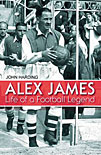 Life Of A Football Legend
Life Of A Football Legend
by John Harding
DB Publishing, £16.99
Reviewed by Terry Staunton
From WSC 284 October 2010
Transfer negotiations between the two world wars may not have been as rife with the creative – and occasionally dubious – wheeler-dealings of modern times, but there were still a few inspired solutions to securing the services of a top player. In 1929, when Alex James was looking for a move away from a supposedly tight-fisted Preston to what he considered a bigger and more ambitious club, he resisted overtures from both Liverpool and Manchester City before Arsenal stepped in with an ingeniously structured offer.
The fee of £8,750 was to everyone's liking, but to circumvent the restrictions of the maximum wage and sweeten the deal for James himself, Gunners manager Herbert Chapman arranged for his new signing to take on a part-time job, netting him a further £250-a-year as a "sports demonstrator" at Selfridges in the west end of London. It was almost double most store employees' wages (and for considerably fewer hours work), and the arrangement was indicative of the player's lifelong business savvy; as a child growing up in Bellshill he would go door-to-door with friends singing a "poverty poem" to earn money to buy a ball.
Harding's book was first published in 1988, long before the player biography market had reached the ubiquity of today, when shelves are over-stacked with tomes dedicated to all manner of lower-league journeymen.
The "legend" of the title is confirmed by James being an integral part of an Arsenal side that won four titles and two FA Cups in the first half of the 1930s. However, his contribution could have been much greater, had lengthy injuries not kept him out of the team (ultimately, he scored just 27 goals for the Gunners in a total of 261 appearances). Likewise, he earned only eight Scotland caps, partly due to Preston's reluctance to release him for internationals when he was in his mid-20s.
Beyond excitable passages thrilling to James's passing ability and ball control (several Arsenal scholars have made comparisons with a more recent Highbury favourite, Dennis Bergkamp), Harding succeeds in portraying his subject as a quick-witted and engaging character, via archive newspaper interviews. When asked by Chapman to make a greater effort in assisting the team's defenders, the inside-forward told one reporter: "Being human, and not a whirlwind, I say frankly that it cannot be done." It was this forthright attitude and eagerness to demystify the game, Harding suggests, that endeared him to the faithful as much as his formidable footballing brain on the pitch.
He retired from playing in 1937, but took the then unusual step of coaching abroad, helping the Polish national side prepare for the 1940 Olympics, until the Second World War forced the cancellation of the games. He would return to Arsenal in 1949 to coach the youth teams, where he remained until his death from cancer two years later, triggering an outpouring of grief among fans for the man they came to know as "wee Alex", who, as Harding himself concludes, "made those present on the terraces feel good to be alive".